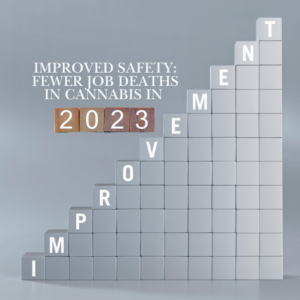Mental Health Solutions for Cannabis Frontline Workers’ Well-being

Addressing Mental Health Challenges for Cannabis Frontline Workers: A Call for Support in an Emerging Industry
As the cannabis industry continues to grow, so does the recognition of the importance of mental health within the sector. Specifically, there is an increasing focus on the mental health challenges faced by frontline workers—the budtenders, cultivators, delivery drivers, and production staff who play a critical role in the success of cannabis businesses. While much of the conversation around cannabis has centered on its therapeutic benefits, less attention has been paid to the well-being of the individuals who work within the industry. However, as the sector matures, there is a growing understanding that addressing mental health challenges for cannabis frontline workers is not just a moral imperative but also a business necessity.
The Mental Health Struggles in the Cannabis Industry
Cannabis frontline workers are often tasked with long hours, high-stress environments, and the need to constantly stay updated on evolving product knowledge, compliance regulations, and customer expectations. The industry, still relatively young in many regions, has had to adapt rapidly, and those working on the frontlines are often the first to experience the challenges that come with growth, uncertainty, and change.
Frontline workers face unique stressors that can impact their mental health, including:
High Customer Expectations and Emotional Labor: Budtenders, the customer-facing staff in dispensaries, often work in high-pressure environments where they are expected to provide knowledgeable, empathetic service. Customers may come in with specific needs—whether for pain management, relaxation, or recreational use—and the pressure to meet those expectations can be emotionally taxing.
Unpredictable Work Hours: Cannabis businesses, particularly dispensaries and cultivation centers, often operate outside typical business hours, with evening, weekend, and holiday shifts becoming the norm. The lack of a predictable schedule can create challenges in balancing work and personal life, leading to burnout and mental fatigue.
Job Insecurity and Legal Ambiguities: Despite cannabis being legal in many states, the federal landscape remains uncertain, leaving many workers in a state of insecurity. For employees, the legal gray areas can translate into fear of job loss, arrest, or regulatory penalties, all of which can negatively impact mental health.
Lack of Mental Health Resources: Many cannabis businesses, particularly smaller operators, lack the infrastructure or resources to provide adequate mental health support for their staff. Employees may struggle to access counseling services, therapy, or stress-reduction programs, leaving them to navigate mental health challenges on their own.
Stigma Around Mental Health and Cannabis Use: There is still a societal stigma around cannabis use, and for frontline workers who may also be consumers of cannabis, the fear of judgment or scrutiny can lead to internal conflict. This stigma can be exacerbated when workers face mental health challenges, preventing them from seeking the help they need.
The Impact of Mental Health Challenges on Cannabis Businesses
The toll of mental health issues on cannabis frontline workers is not limited to the individuals themselves—it can extend to the businesses they work for as well. The impact of poor mental health can manifest in several ways:
Increased Turnover Rates: According to a report by the National Institute for Occupational Safety and Health (NIOSH), employees suffering from high levels of stress or burnout are more likely to leave their positions. High turnover rates in cannabis businesses can be costly, both in terms of recruitment expenses and the loss of experienced personnel.
Decreased Productivity and Engagement: Workers struggling with mental health issues may not be able to perform at their full potential. This can lead to decreased customer satisfaction, operational inefficiencies, and a drop in overall business performance.
Workplace Accidents: Chronic stress, anxiety, and depression can impair focus and decision-making abilities, increasing the likelihood of workplace accidents. For those working in cultivation or production, this could result in damage to valuable inventory or even personal injury.
Negative Impact on Company Culture: A lack of attention to mental health can create a toxic work environment, where employees feel unsupported, disengaged, or disconnected from the company. A strong, positive company culture is essential in attracting and retaining top talent, and failing to address mental health issues can jeopardize that.
Building a Supportive Environment for Cannabis Frontline Workers
Recognizing the unique challenges faced by cannabis frontline workers is the first step toward improving mental health in the industry. However, real change requires action. Here are some strategies that cannabis businesses can implement to support the mental health and well-being of their frontline employees:
Create a Mental Health Support System
Cannabis businesses can take immediate action by offering mental health support resources. These can include access to therapy or counseling, employee assistance programs (EAPs), and stress management workshops. The availability of confidential support can make a significant difference for employees struggling with their mental health.
Implement Training Programs for Stress Management
Given the high-pressure environment that frontline cannabis workers often face, stress management training is essential. Companies can offer employees mindfulness techniques, time management strategies, and resilience-building exercises to help them cope with stress. Providing a wellness program that includes yoga, meditation, or relaxation exercises can also help employees recharge.
Introduce Flexible Work Hours and Paid Time Off
Work-life balance is essential for maintaining mental health. Cannabis businesses can provide more flexible scheduling to allow employees to manage their personal commitments more effectively. This could mean rotating shifts, offering remote work options for certain positions, or simply encouraging workers to take time off when needed. Paid time off (PTO) policies should be generous and encouraged to ensure that workers take time to rest and recharge.
Foster an Open Dialogue About Mental Health
To reduce the stigma surrounding mental health issues, cannabis companies should create a culture of open dialogue. Encouraging employees to talk about their mental health challenges without fear of judgment can help normalize the conversation. This can be achieved through town hall meetings, mental health awareness days, and the inclusion of mental health discussions in regular training.
Promote a Supportive Company Culture
A company culture that prioritizes the well-being of employees can lead to better engagement and job satisfaction. Cannabis businesses can foster a supportive work environment by offering opportunities for team-building, mentoring, and peer support. Recognizing and rewarding employees for their hard work can also improve morale and create a positive atmosphere.
Provide Training for Management on Mental Health Awareness
Managers and supervisors play a critical role in identifying mental health issues in employees. Providing training for leadership on recognizing the signs of stress, burnout, and other mental health issues can help prevent problems from escalating. Managers should be equipped with the tools to offer support, provide resources, and guide employees toward seeking professional help if needed.
Offer Clear Career Pathways and Job Security
Employees who feel uncertain about their future in the cannabis industry may be more prone to mental health struggles. By offering clear career development opportunities, training programs, and advancement pathways, cannabis businesses can reduce stress and help employees feel more secure in their roles. Additionally, offering stability in employment and assurances regarding job security can alleviate anxiety.
The Role of Government and Industry Advocacy
The cannabis industry must also advocate for stronger regulations and legislation that support mental health in the workplace. This could include tax incentives for businesses that provide mental health benefits, mandatory workplace mental health policies, or funding for employee wellness programs. Additionally, industry groups, such as the National Cannabis Industry Association (NCIA) and state-level cannabis organizations, can help raise awareness and provide resources for mental health initiatives.
As the cannabis industry continues to grow, there will likely be more pressure to provide workplace protections and resources for mental health. Governments at both the state and federal levels can play a pivotal role by implementing policies that prioritize employee well-being, particularly in emerging industries like cannabis.
Addressing mental health challenges for cannabis frontline workers is essential for the long-term success and sustainability of the industry. By acknowledging the unique stressors faced by workers and implementing comprehensive support systems, cannabis businesses can create a healthier, more productive workforce. As more companies prioritize mental health, it will not only improve employee well-being but also enhance customer satisfaction, reduce turnover, and foster a positive company culture. In turn, this will help the cannabis industry as a whole flourish while ensuring that the frontline workers who drive the sector’s growth are supported and valued.
With the right resources and commitment, cannabis businesses can create a future where the mental health of their employees is prioritized, leading to healthier workplaces and a stronger, more resilient industry.











